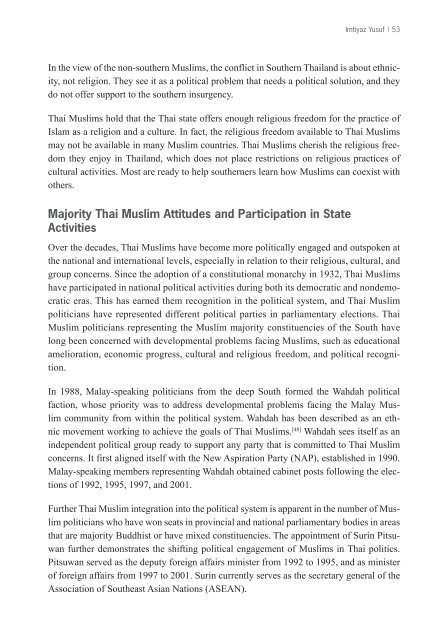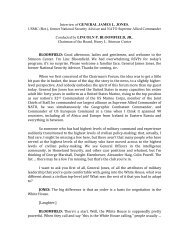Islam and Politics - The Stimson Center
Islam and Politics - The Stimson Center
Islam and Politics - The Stimson Center
Create successful ePaper yourself
Turn your PDF publications into a flip-book with our unique Google optimized e-Paper software.
Imtiyaz Yusuf | 53<br />
In the view of the non-southern Muslims, the conflict in Southern Thail<strong>and</strong> is about ethnicity,<br />
not religion. <strong>The</strong>y see it as a political problem that needs a political solution, <strong>and</strong> they<br />
do not offer support to the southern insurgency.<br />
Thai Muslims hold that the Thai state offers enough religious freedom for the practice of<br />
<strong>Islam</strong> as a religion <strong>and</strong> a culture. In fact, the religious freedom available to Thai Muslims<br />
may not be available in many Muslim countries. Thai Muslims cherish the religious freedom<br />
they enjoy in Thail<strong>and</strong>, which does not place restrictions on religious practices of<br />
cultural activities. Most are ready to help southerners learn how Muslims can coexist with<br />
others.<br />
Majority Thai Muslim Attitudes <strong>and</strong> Participation in State<br />
Activities<br />
Over the decades, Thai Muslims have become more politically engaged <strong>and</strong> outspoken at<br />
the national <strong>and</strong> international levels, especially in relation to their religious, cultural, <strong>and</strong><br />
group concerns. Since the adoption of a constitutional monarchy in 1932, Thai Muslims<br />
have participated in national political activities during both its democratic <strong>and</strong> nondemocratic<br />
eras. This has earned them recognition in the political system, <strong>and</strong> Thai Muslim<br />
politicians have represented different political parties in parliamentary elections. Thai<br />
Muslim politicians representing the Muslim majority constituencies of the South have<br />
long been concerned with developmental problems facing Muslims, such as educational<br />
amelioration, economic progress, cultural <strong>and</strong> religious freedom, <strong>and</strong> political recognition.<br />
In 1988, Malay-speaking politicians from the deep South formed the Wahdah political<br />
faction, whose priority was to address developmental problems facing the Malay Muslim<br />
community from within the political system. Wahdah has been described as an ethnic<br />
movement working to achieve the goals of Thai Muslims. [48] Wahdah sees itself as an<br />
independent political group ready to support any party that is committed to Thai Muslim<br />
concerns. It first aligned itself with the New Aspiration Party (NAP), established in 1990.<br />
Malay-speaking members representing Wahdah obtained cabinet posts following the elections<br />
of 1992, 1995, 1997, <strong>and</strong> 2001.<br />
Further Thai Muslim integration into the political system is apparent in the number of Muslim<br />
politicians who have won seats in provincial <strong>and</strong> national parliamentary bodies in areas<br />
that are majority Buddhist or have mixed constituencies. <strong>The</strong> appointment of Surin Pitsuwan<br />
further demonstrates the shifting political engagement of Muslims in Thai politics.<br />
Pitsuwan served as the deputy foreign affairs minister from 1992 to 1995, <strong>and</strong> as minister<br />
of foreign affairs from 1997 to 2001. Surin currently serves as the secretary general of the<br />
Association of Southeast Asian Nations (ASEAN).

















